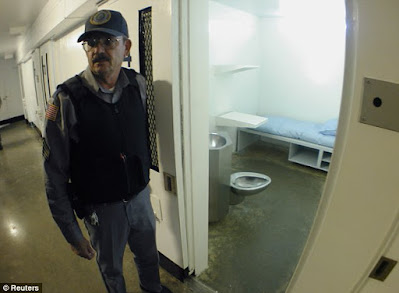Most death row inmates may be racing against time when it comes down to their final days, waiting for a court to halt their execution often just hours before it's scheduled.
But it was a different kind of race for Max Soffar, who had his own biological clock to battle with as he looped through the lengthy, convoluted appeals process.
For years, his committed defense team had worked feverishly to secure an exoneration based on a false confession. But on Sunday evening, at the Polunsky Unit in Livingston, Soffar's time expired.
He died of terminal liver cancer in the death row infirmary; he had spent 35 of his 60 years in prison.
Although no physical evidence had ever connected Soffar to the murders, he was convicted in 1982 of shooting 3 employees of a Houston bowling alley, execution-style. The crime rattled the city for months. With the help of a witness who survived a bullet to the head, a police detective drew up a sketch of the suspect and offered a $15,000 reward to whomever could identify him. And as both Texas Monthly's Michael Hall and Texas Southern University journalism professor Michael Berryhill have written about extensively, that financial incentive would ultimately put Soffar behind bars for the rest of his life.
As Berryhill wrote in a lengthy Houston Chronicle piece 2 years ago, Soffar was a 7th-grade drop-out who had been addicted to drugs his whole life, already born with liver and brain damage at birth because of fetal alcohol syndrome. At the time he was convicted, he had been running with burglars and other drug addicts for years, though he had acted as an informant to police as well. He reportedly believed he could pin the bowling alley murders on a fellow criminal who looked like the guy in the sketch, then recover the $15,000 and walk away.
Instead, even though the details Soffar originally gave to detectives about that night in no way synced with the actual crime scene, police were able to pressure Soffar into changing his story several times - from never even being present and only waiting in the getaway car, to only witnessing the murders, then, finally, to being forced by his accomplice to shoot people. During his trial, this confession was the only evidence that jurors relied on to send Soffar to death row. And that, Berryhill says, is the most troubling facet of Soffar's case.
"These cases are frustrating, where you have a confession, no physical evidence, but the crime is so horrendous that the jury feels impelled to render a verdict," he told the Houston Press. "Even with such an improbable confession."
In 2006, Soffar's appeals attorney, Andrew Horne, was able to secure a new trial after arguing that he had ineffective counsel the first time. As Berryhill reported, Horne had hoped to call to the stand a witness named Stewart Cook, who had been a partner in crime with a man named Paul Reid, who allegedly told Cook he was behind the Houston bowling alley murders. Reid was already in prison in Tennessee, convicted for murders that a Tennessee police detective said were strikingly similar to the bowling alley case. But State District Judge Mary Lou Keel wouldn't let that into evidence, apparently not believing the crimes were similar enough. And Cook never made it to the stand either, because prosecutors threatened to try him for murder if he testified.
So for the 2nd time, Berryhill said, a jury found him guilty after weighing nothing but his confession, never able to hear an alternative theory that may have raised just enough reasonable doubt to acquit him.
"False confessions, I think, are really hard for the average person to swallow, because they can't imagine anyone confessing to something they didn't do," Berryhill said. "But the average person may not be aware of all of these factors."
Berryhill is hopeful that, if anything, Soffar's case becomes a catalyst in changing police interrogation tactics, or at least contributes to the growing public awareness about the problem.
But beyond that, some justices on the U.S. Supreme Court have even begun to signal that the time has come to reconsider the constitutionality of the death penalty because of cases much like Soffar's. Last year, for example, Justice Stephen Bryer called out 2 Texas cases, punctuating the very real possibility that the state may have taken innocent lives. He highlighted the case of Carlos Deluna, who was executed in 1989 despite insisting for years that a different man named Carlos had killed a woman at a gas station, which was later confirmed in a book; and Cameron Todd Willingham, who was executed for setting his house on fire and killing his kids inside for reasons that were never clear - even though the fire science used to convict him was later considered "junk science."
We'll never know what would have come of Soffar's latest appeals. The Fifth Circuit Court of Appeals recently agreed to hear his case, perhaps one of the last chances he would have had at an exoneration. The court was scheduled to hear oral arguments tomorrow.
Source: Houston Press, Meagan Flynn, April 26, 2016











